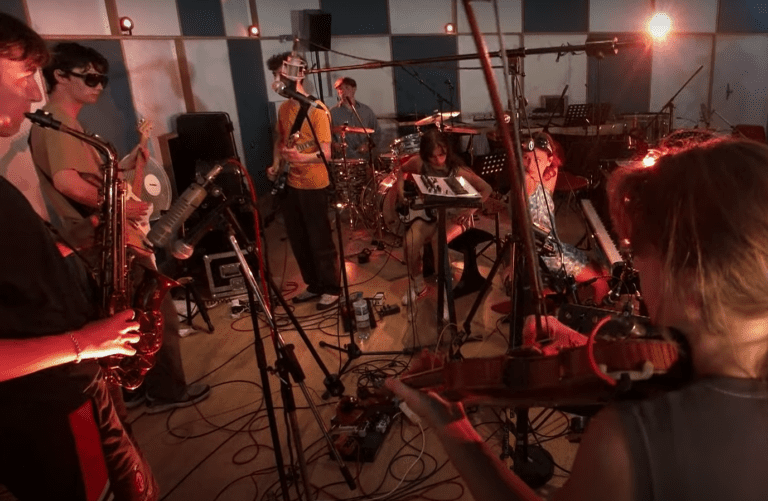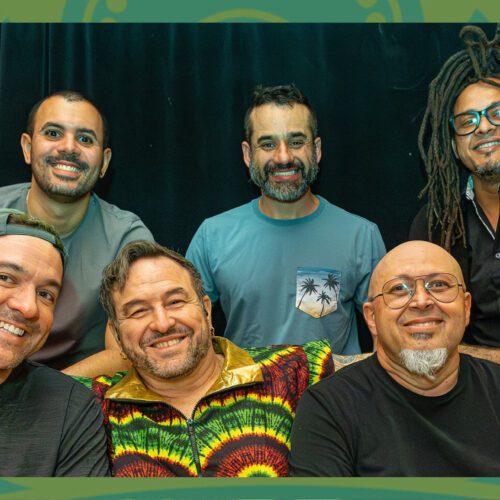Additional Information
The young London-based band is made up of seven musicians from a variety of backgrounds: singer, lyricist and guitarist Isaac Wood, bassist Tyler Hyde, saxophonist Lewis Evans, violinist Georgia Ellery, keyboardist May Kershaw, drummer Charlie Wayne and guitarist Luke Mark harbour a sincere ideal of creative democracy.
Ninja Tune’s recent release of the album For the First Time confirms the septet’s reputation for intense, theatrical, fiery performances in front of a live audience. But… for obvious reasons, we’ll have to be patient before we have the proof in the flesh.
In the meantime, PAN M 360 connected with Hyde and Wayne in London.
PAN M 360: Black Country, New Road proposes a very particular expression and a mix of genres: post-punk, post-rock, Crimsonian prog, noise, polka rock, but also contemporary chamber music, american minimalism and free jazz. How do you see this wide eclecticism?
TYLER HYDE: First of all, I would say that it is not the result of planning. All we wanted to do was make music with friends. It’s really hard for us to list our influences because we are 7 people with very different tastes. We share some similar references but also so many different ones. The only way for us to illustrate them was to articulate them in our music and our playing. So this mix is not the result of a spoken conversation but of a musical conversation. This music is based on very strong friendships and an equally strong passion for music.
PAN M 360: Of course, mixing influences cannot be a plan or a recipe when it comes to artistic creation. Rather, it is an expression of the unconscious, the dynamics of artistic interaction and emotional relationships between the artists involved in the creative process. But… once the unconscious has expressed itself, can we get a glimpse of what has been achieved?
TYLER HYDE: Yes, we can express it now. Accidentally, we had created the music for For the First Time. We hadn’t thought about a planned and consistent collection of these songs, several random elements successfully came together. For our second album in the making, we thought more about what we wanted to do at the beginning, what would be appropriate for us. We thus implemented a concept album, totally distinct from the first one.
PAN M 360: What’s also very interesting about Black Country, New Road is the mix between pop culture references and more complex music. Where does that interest come from?
TYLER HYDE: The group is made up of self-taught musicians and others educated in music schools. The educated musicians don’t put pressure on the self-taught musicians to reach an ideal technical level, we prefer to find common ground, everyone should feel comfortable. So we don’t make any separation between the two groups, rather we try to create a common language.
PAN M 360: To be more precise, how do you see the group’s progress since its beginnings?
CHARLIE WAYNE: We are still aware of the good things that have been accomplished, but we want to make important changes to our work. We need to move on. Structurally we’re the same band, but we’re trying to write more concise songs now. We want songs sculpted from the same material rather than building piece by piece, section by section. That’s very important to us. For the first album, seven musicians assembled eclectic concepts while for the second one, this time we wanted to be less random, to propose better defined and perennial structures, more succinct, more dense. This next album may be less dissonant, it may be as strange for some people, but not for the same reasons.
TH: We’re now trying to generate intensity without betting on a post-punk aesthetic, without exaggerating on the distortion pedal, without playing all at the same time. Intensity can also come out with reduced sound information, with gradual introductions, with different tensions produced by each instrument involved. So we have been thinking about these new creative strategies since our beginnings. Not playing in front of a crowd during the pandemic also led us to this reflection because we could no longer test our hypotheses on stage, there was no longer this guinea pig allowing us to better understand our sound. This is why the composition process this time was much more meticulous. Thus, we learned how to generate intensity and emotions without the feedback of the live performance. This is why our sound is already very different from what it was before the pandemic. We are almost finished with the songs for this second album, we want to record and release it as soon as possible.
PAN M 360: Could you provide an example of a creative session in your band?
CW: Okay. Somebody can submit to the band some fragments of a song or a basic structure. It can come from Isaac, but it can also come from any member of the group. From this skeleton, it’s up to each of us to make this first vision come true by giving it additional parts. The intention is therefore very different from a group in which there is a central composer, it is excluded to tell anyone what to do. Once the structure is accepted, each member of the group can blossom and bring the song to life.
TH: It’s possible to do this because we know each other well, because we know how we play, because we now know what we’re good at and what we’re not good at, musical conversations are possible and can multiply. For the performances we are in a way co-pilots. We all have partial information that naturally overlaps. I may know, for example, what Charlie and Luke are doing by my side, but I may not know what Lewis is doing or can propose so that my playing can be in symbiosis with his. This then has an impact on our writing process. So we have to try to improve our listening to each other, we have to constantly evolve this conversation.
CW: I could listen more to Tyler, Tyler could listen more to Luke and I, Luke could listen more to Isaac and so on and so forth, so it all flows together, we become listening to each other, we can then move forward.
PAN M 360: So it’s a real collective work and ideal. Is it always like that?
CW: As much as possible, we try to avoid giving the composition to only one leader. We don’t think that would be particularly useful for this group. We think everyone’s idea is valid. We all know each other’s instruments, so everyone can come up with something very creative, based on their own talent, knowledge and sensibility.
PAN M 360: It’s a great ideal to want to achieve the perfect balance of creativity within a collective. But how do you maintain this balance?
TH: It’s difficult, but we try to make it work. If someone in the room has been silent for a while, we ask, ‘hey, what do you think?’ We do that knowing that everyone decides to express themselves or not in certain contexts.
CW: And don’t hesitate to use this interview as an example in the case of lawsuits between creators (laughs).
PAN M 360: What about the lyrical aspect?
TH: The lyrics of our pieces come 100% from Isaac, it’s a separate dimension of the music. I think Isaac’s goal is to write lyrics that anyone, at any given moment, can understand and relate to.
CW: Tyler and I are not perfectly comfortable talking about what Isaac writes. It’s not really our area. But we like this mix of inspiration from great lyricists like Leonard Cohen and allusions to pop culture, which we think is a powerful evocation tool because pop culture belongs to the collective imagination. It unites us.
PAN M 360: How will the new material be adapted on stage after the pandemic?
CW: We’re really looking forward to it! Having said that, it was a luxury for us not to do a show and to focus on ourselves, our sound, our compositions, our university studies for some. So we took this year to finish this life before starting our new life. And there’s nothing like playing live. We’re really looking forward to coming back with our new music and playing the music from our first album as well.
TH: If at the first return concert we hear our fans singing songs from the first album after this break and this transformation, it might be weird, but it might also be overwhelming.
























